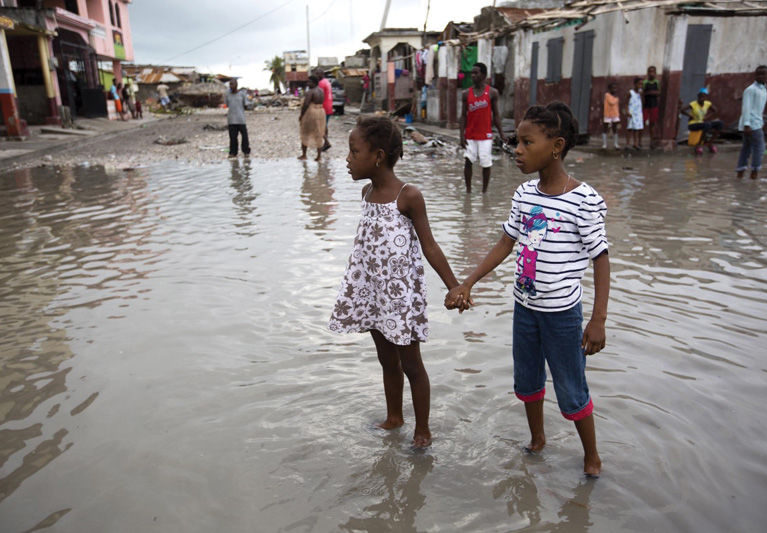
As people in Indian River County were battening down the hatches in advance of Matthew’s arrival, many were also concerned about what the situation was like in Haiti, especially relative to Haiti Partners and Haiti Clinic, where our local residents serve as board members, health care providers, volunteers and financial supporters.
Haiti Partners was co-founded by John Engle, who has homes in Haiti and Vero Beach, and Vero resident Kent Annan. As Engle rode out the storm in Haiti, he provided regular video updates via Facebook and their website, and after the storm chatted by phone about conditions there. He noted that while their phone and Internet infrastructure is expensive, it works well and enables them to stay in touch with the rest of the world.
The embodiment of its name, Haiti Partners is a proponent of partnerships with schools, churches and entrepreneurships. Its flagship Children’s Academy and Learning Center is located on a three-acre campus in the rural mountainous region of Baocia, just south of Port-au-Prince.
After the devastating 2010 earthquake, generous donations to Haiti Partners enabled them to rebuild with stronger structures. Engle credited Extollo International with providing training and oversight to empower parents of the school’s students to construct earthquake- and hurricane-resistant buildings.
“What peace of mind we have when we know that if an earthquake or hurricane is coming that everything here is going to be stable; everything is going to be fine. We’ve been at this for a long time,” said Engle. “When we’re doing things in Haiti, we do it with the long view in mind. Sustainability is what we’re thinking of; building Haitian capacity. It’s all about helping Haitians change Haiti.”
Engle said that other than a couple of inches of water, which they could sweep out, the campus had very little damage. Additionally, they were able to collect 50,000 gallons of water in the school’s reservoir which will be filtered and used as drinking water, for washing, gardening, construction and for their newest entrepreneurial business, which is hand-making paper out of mango peels, corn husks, banana bark and a Haitian plant called Vertiver.
“Our school has some small streams and we have an extensive school garden, which includes banana, avocado, spinach and eggplant, and there’s some damage to that but not anything terrible. In terms of structural damage there’s nothing; it’s really built well,” Engle added.
By Wednesday people were harvesting the fruits and vegetables before they could rot on the ground and parents, who must work four hours per week to have their children attend the school, were helping to get things ready for students who were eager to return to the classroom the next day. However, in the neighborhood surrounding the school, there are many people who were unable to rebuild after the earthquake and are still living in little more than lean-tos.
“Their houses are constructed of pieces of wood, corrugated tin, tarps, and they’re not fit to protect them in heavy rain. So they get wet a lot,” Engle explained. “The children who come to our school are prone to get sick more often because they’re in damp, unhealthy conditions.”
The majority of the destruction occurred in the southwestern peninsula, cities such as Les Cayes and Jeremie, which were hit very hard with flooding and strong winds. While most of their partner schools in that area fared well, some of their Micah scholars reported damage to their homes. Micah scholars are given scholarships by Haiti Partners to work toward undergraduate degrees at various Haitian seminaries, with a goal of becoming justice advocates in their communities on behalf of exploited women and children.
Engle said they were still waiting to hear the fate of a partner school located in the remote Ile de la Gonave, where telephone signals were still out. They did learn that their poultry business there was relatively OK, but that homes of staff members were damaged.
“Livelihoods have been destroyed in La Gonave, because many, many animals have died and gardens are destroyed. They have really been hit hard,” he added.
There was also a lot of flooding in Cite Soleil, where families used their school as a shelter, but Engle said the mood of the people remains optimistic despite the adversity.
“Once again we see amazing resilience among the Haitian people that we can learn from. Anecdotally when we were driving yesterday we passed a water spot, where people convene to fill up their buckets for their homes. It was raining, everyone was soaked and yet they were smiling and laughing,” said Engle. “My 8-year old daughter said to my wife and I, ‘Why are they smiling? It’s a hurricane.’ We said that’s what Haitians know; to be resilient. They know how to make the most of a situation regardless of how tough it is.”
With crops destroyed from significant flooding combined with a lack of sanitation the next worry is an increased threat of hunger and disease, such as cholera.
“We have created a fund with the hurricane to help families in our community and network who are most vulnerable,” said Engle. “People can give specifically to that fund through Haiti Partners.”
To donate, visit https://haitipartners.secure.force.com/HurricaneMatthewEmergencyRelief/



